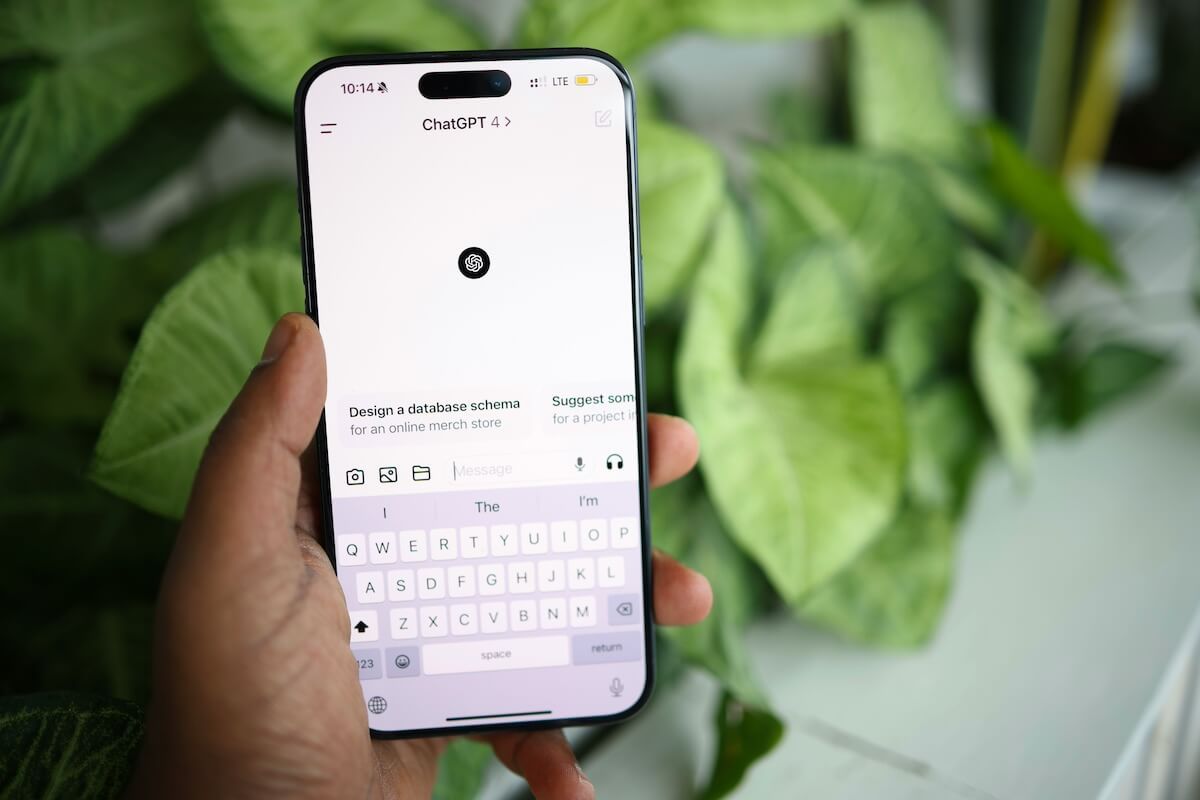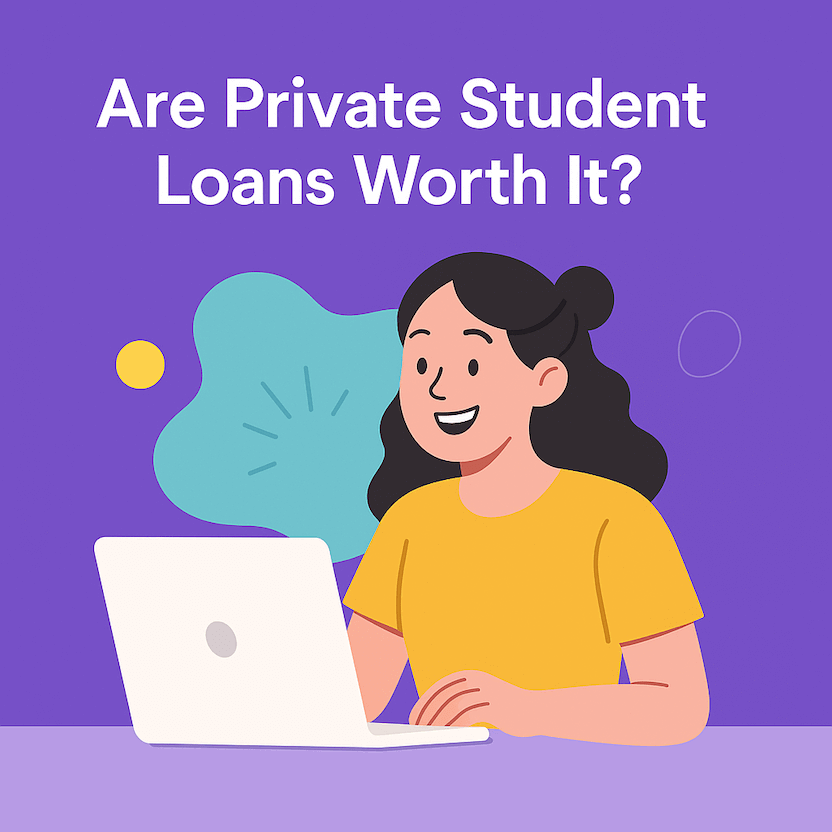Advertiser Disclosure
Last update: August 28, 2025
7 minutes read
I Asked ChatGPT If Private Student Loans Are Worth It — Here’s What It Said
Are private student loans worth it in 2025? ChatGPT and Claude break down the pros, cons, and smart borrowing strategies so you can make informed decisions.

By Derick Rodriguez, Associate Editor
Edited by Yerain Abreu, M.S.
Learn more about our editorial standards



By Derick Rodriguez, Associate Editor
Edited by Yerain Abreu, M.S.
Learn more about our editorial standards
I’ll be honest, I was stressed when I started digging into private student loans. My federal aid package barely covered half my tuition, and every friend, parent, and random Reddit thread had an opinion.
Some said private loans were fine. Others said they were financial suicide. Meanwhile, the tuition deadline wasn’t waiting for me to figure it all out.
I needed real answers — not scare tactics, not vague “you’ll figure it out” advice. So, I did what any overwhelmed student might do: I asked ChatGPT.
I wasn’t expecting much. I figured it would give me generic, surface-level advice. But honestly? What I got back surprised me.

Key takeaways
- Private student loans can bridge funding gaps but lack federal protections like forgiveness and income-driven repayment
- Always max out federal aid first, compare multiple lenders, and avoid borrowing more than you can realistically repay
- Treat private loans as a last resort; borrow conservatively and fully understand the terms before committing
What ChatGPT said
ChatGPT broke it down way better than I thought an AI would:
“Private student loans can help bridge funding gaps when federal aid isn’t enough. If you or your cosigner have strong credit, you might qualify for competitive rates. But there are trade-offs:
- No forgiveness programs: Unlike federal loans, you can’t get these forgiven through income-driven repayment or public service.
- Limited flexibility: Private lenders aren’t required to offer hardship options or extended deferments.
- Cosigner requirements: Most students need one, and that means putting someone else’s credit on the line.
- Variable rates: What looks affordable today could balloon later if your rate isn’t fixed.
Always max out federal aid first, compare multiple private lenders carefully, and know exactly what repayment will look like before you sign.”
I expected vague warnings like “be careful,” but this was straightforward. It didn’t tell me “yes” or “no”, it gave me the facts so I could make my own decision.

What Claude said
After hearing ChatGPT’s take, I was curious if Claude would give me a different perspective on private student loans. Its response was surprisingly detailed and a little more cautious:
“Here's when private student loans make sense and when to avoid them:
When Private Loans Might Be Worth It: If you've maxed out federal aid and still need funding for essential education costs. Private loans can fill gaps when federal loans don't cover your full need.
For graduate students or parents who may qualify for lower interest rates than federal PLUS loans, especially with excellent credit (typically 720+ credit score).
Major Drawbacks: No federal protections like income-driven repayment plans, forbearance options, or loan forgiveness programs. You lose significant safety nets.
Interest rates are credit-dependent and often variable, meaning they can increase over time. Poor credit means much higher rates than federal options.
Before Considering Private Loans: Exhaust all federal aid first - Direct Subsidized, Unsubsidized, and PLUS loans. Complete the FAFSA and explore grants, scholarships, and work-study programs.
Compare total borrowing needs versus expected post-graduation income. Avoid borrowing more than your anticipated first-year salary.
Shop Carefully: If you must use private loans, compare rates from multiple lenders. Look for options with rate discounts for autopay and good customer service records.”
Compare private student loans now
TuitionHero simplifies your student loan decision, with multiple top loans side-by-side.
Compare Rates
My take on ChatGPT vs. Claude
Claude’s advice lined up with a lot of what ChatGPT said, but came across with a slightly different tone. While ChatGPT focused on giving me a structured framework for deciding when private loans might make sense, Claude leaned harder into the risks and long-term consequences.
ChatGPT gave me a clear checklist: max out federal aid, compare lenders, and understand the trade-offs. Claude added an extra layer of caution — emphasizing things like:
- Avoid borrowing more than your expected first-year salary
- Be realistic about how variable interest rates can grow over time
- Compare multiple lenders carefully before committing
I actually found the two perspectives complement each other really well. ChatGPT helped me understand the mechanics of private loans, while Claude drove home the importance of planning ahead and not overborrowing.
At TuitionHero, this is exactly the balance we try to provide: we break down the facts clearly while helping students think through the bigger picture so they can make confident, informed decisions.
The reality check I needed
After digging a little deeper, I realized how easy it is to fall into debt traps if you don’t understand the terms. Private loans aren’t bad by default; they’re just less forgiving.
With federal loans, there are safety nets:
- Income-driven repayment plans that adjust based on what you earn
- Options for deferment or forbearance if life throws you a curveball
- Forgiveness programs for certain careers or after a set number of years
Private loans? Not so much. Lenders might work with you, but they’re not required to.
And those “starting at 4%” interest rates you see advertised? They’re usually reserved for borrowers with excellent credit and stable income. In other words, not most college students.
The kicker? Some private loans have variable rates, meaning your monthly payments can climb over time. That’s fine if you land a high-paying job right after graduation… but terrifying if you don’t.
What I’ve learned helping students at TuitionHero
Working at TuitionHero, I talk to a lot of students who feel exactly like I did — confused, overwhelmed, and unsure where to start.
What I’ve learned is that private student loans can absolutely be useful, but only if you:
- Fully understand the trade-offs
- Compare multiple lenders to avoid overpaying
- Borrow conservatively and only what you need
That’s why we create guides that break this down in plain English and provide side-by-side lender comparisons. It’s not about pushing one “right” answer. It’s about giving you the clarity you need to make the best decision for your situation.
What I tell friends now
If you’re considering private loans, here’s my personal checklist:
- Max out federal options first: Grants, scholarships, subsidized loans, and unsubsidized loans.
- Do the math: Use calculators to check what your monthly payments could look like.
- Compare multiple lenders: Never settle for the first offer. Check at least 3–4.
- Understand the risks: Variable rates, cosigners, and lack of forgiveness programs.
- Borrow conservatively: Take only what you need, not what they offer.

Why trust TuitionHero
At TuitionHero, we help you find the best private student loans by comparing top lenders and breaking down eligibility, interest rates, and repayment options. Whether you need additional funding beyond federal aid or a loan without a cosigner, we simplify the process. We also provide expert insights on refinancing, FAFSA assistance, scholarships, and student credit cards to support your financial success.
Final thoughts
Private student loans are tools, not traps, but only if you know how to use them. They can bridge the gap when federal aid falls short, but they come with risks you can’t ignore.
The most dangerous move? Borrowing without a plan.
The smartest move? Borrowing as little as possible and fully understanding the repayment terms.
At TuitionHero, we’re here to make that easier by helping you compare lenders, understand your options, and stay on top of policy changes so you can make confident, informed decisions about your education.
Your future self will thank you for taking the time to get this right.
Author

Derick Rodriguez
Derick Rodriguez is a seasoned editor and digital marketing strategist specializing in demystifying college finance. With over half a decade of experience in the digital realm, Derick has honed a unique skill set that bridges the gap between complex financial concepts and accessible, user-friendly communication. His approach is deeply rooted in leveraging personal experiences and insights to illuminate the nuances of college finance, making it more approachable for students and families.
Editor

Yerain Abreu
Yerain Abreu is a Content Strategist with over 7 years of experience. He earned a Master's degree in digital marketing from Zicklin School of Business. He focuses on college finance, a niche carved out of his journey through the complexities of academic finance. These firsthand experiences provide him with a unique perspective, enabling him to create content that's informative and relatable to students and their families grappling with the intricacies of college financing.
At TuitionHero, we're not just passionate about our work - we take immense pride in it. Our dedicated team of writers diligently follows strict editorial standards, ensuring that every piece of content we publish is accurate, current, and highly valuable. We don't just strive for quality; we aim for excellence.
Related posts
While you're at it, here are some other college finance-related blog posts you might be interested in.
Shop and compare student financing options - 100% free!

Always free, always fast
TuitionHero is 100% free to use. Here, you can instantly view and compare multiple top lenders side-by-side.

Won’t affect credit score
Don’t worry – checking your rates with TuitionHero never impacts your credit score!

Safe and secure
We take your information's security seriously. We apply industry best practices to ensure your data is safe.
Finished scrolling? Start saving & find your private student loan rate today
Compare Personalized Rates


